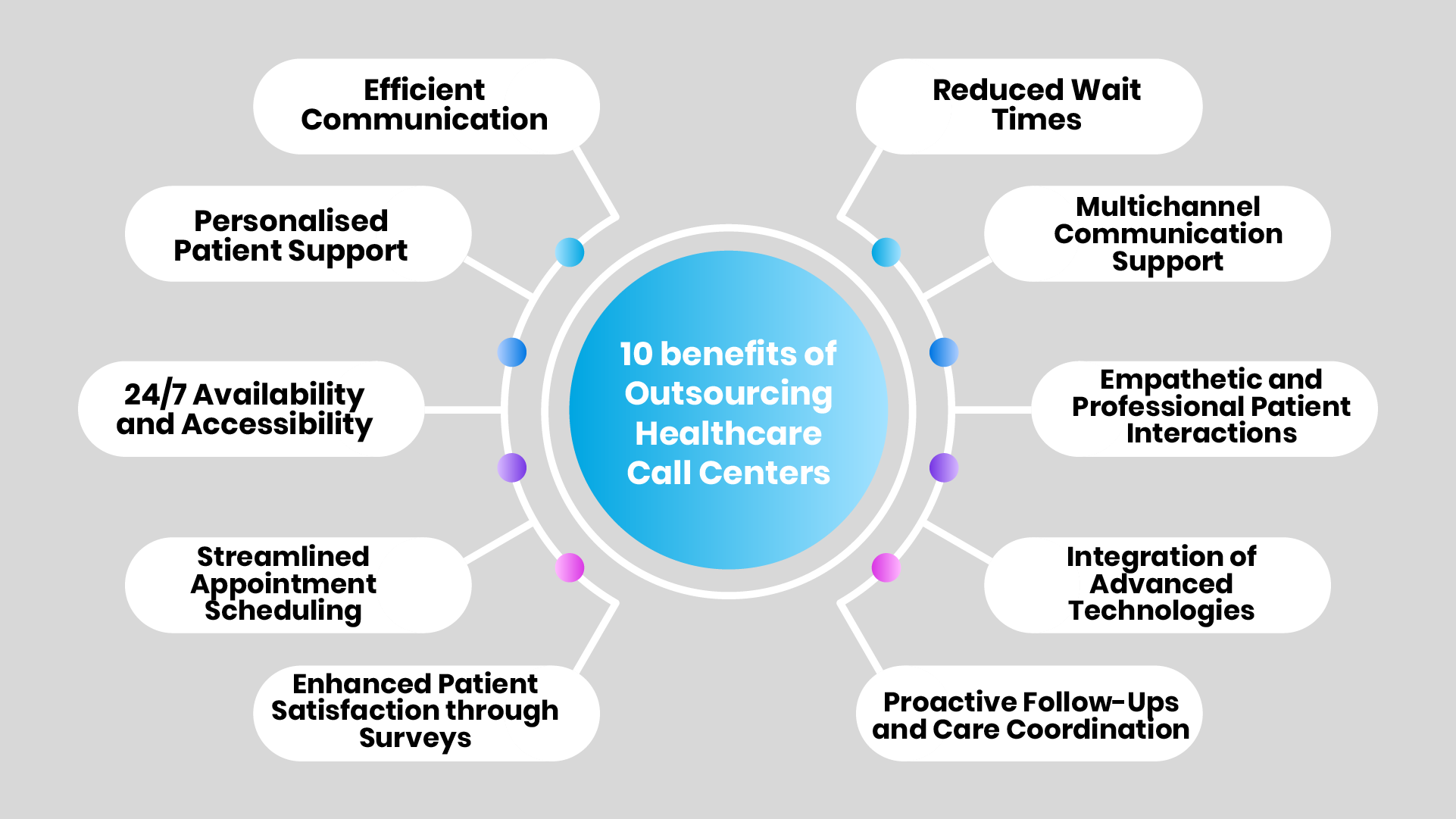
10 Benefits of Healthcare Call Centers for Patients
Healthcare is all about the contentment of the patient and their caretakers. This means availability is the core parameter, promoting healthcare call centres' significance. Healthcare practitioners and patients need to communicate both before and after treatment. These are now primary patient communication and support touchpoints.
Do you know: Reminders from call centers can cut no-shows by 30–50%, and can directly impact clinics' lost revenue, saving approximately $150 billion annually.
Source: Healthcare finance news
With the growth of different branches of medicine like dermatology and dentistry, we see that apart from the treatment, there are cosmetic procedures that are gaining hype. The patients taking them from the clinic are more like clients who expect premium treatment from the practitioners.
The functions of the call center for healthcare extend far beyond basic tasks like appointment scheduling and disseminating medical information. These centres play an integral role in shaping patient experiences, ensuring smoother interactions between patients and healthcare providers, and ensuring the bond is strong from both ends so patients don't feel left out before or after treatment. There are different types of clinical practices, and one can't neglect that they also require patient customer support.
Role Of Healthcare Call Centers In Patient Satisfaction
 The quality of medical treatment is not solely dependent on the patient's recovery; it encompasses the entire service experience, including prompt responses, compassionate communication, and efficient resolution of inquiries and concerns. Imagine not getting a response from your medical health provider when you need it the most!
The quality of medical treatment is not solely dependent on the patient's recovery; it encompasses the entire service experience, including prompt responses, compassionate communication, and efficient resolution of inquiries and concerns. Imagine not getting a response from your medical health provider when you need it the most!As a result, improving patient contentment scores has become a top priority for healthcare organisations striving to build a strong reputation and retain their patients.
As a close branch of telehealthcare practices, healthcare call centers are bridging the gap between the doctor and the patient. This way of interacting with the patients and their caregivers helps create seamless communication and enhances administrative efficiency. This way, the hospitals and other urgent care facilities can improve the patient experience.
This article emphasis finding significance of healthcare call centers for patients and the medical care providers
1) Efficient Communication
Your patient needs attention, but no doctors, nurses, or receptionists are available for the calls. They have to pay attention to the patients, clients, and hospitals. So, to ensure prompt and clear communication for a positive patient experience, there is only one solution! Healthcare call centres minimize wait times and provide accurate information using automated systems and well-trained agents. This ensures patients receive the support they need without unnecessary delays. Additionally, structured communication protocols ensure patient inquiries are directed to the appropriate departments or specialists, improving efficiency.
Now, patients don't have to go to the Healthcare call centers. They also help bridge the gap between patients and medical professionals by addressing initial concerns before a patient enters a healthcare facility. They facilitate communication regarding treatment plans, insurance coverage, and prescription details, ensuring patients have access to the necessary information before their visits.
2) Customized Patient Support
By maintaining comprehensive records, healthcare calling agents will ensure they meet the individual patient's needs. They offer customised support through the relevant medical advice given by the doctor for the patients who have records in the clinic or ongoing treatment.
They are the trained individuals who understand that it is important to give initial support to patients and their caregivers, as per their records. Personalisation in patient support extends to proactive outreach, where call centre representatives follow up with patients based on their previous interactions. For example, if a patient recently had a medical procedure, the call centre may follow up with post-treatment instructions, pain management guidance, and reminders for follow-up appointments. Personalised service fosters trust and ensures patients receive care that meets their needs. In case of the requirement, they can transfer the call to the doctor and the medical staff as well
3) Round-the-Clock Availability & Access
We know that healthcare centres operate around the clock, providing patients with access to care. However, some clinics are not open after hours. This is why they hire healthcare call centres to assist patients 24/7, especially critical for emergencies, appointment scheduling, and urgent medical inquiries.
Patients who require immediate assistance but cannot visit a healthcare facility can benefit from real-time support, whether it is related to medication, test results, or symptom evaluation. The continuous availability of call centre representatives provides peace of mind to patients, particularly those with chronic conditions who may require assistance outside of regular office hours.
4) Streamlined Appointment Scheduling
For the receptionist in the clinic, dealing with the patients while taking calls can get a bit hectic, especially when the call overflow is significant. On the other hand, it is crucial to assist on-call patients. This is why managing appointments can be time-consuming and complex for one person. Healthcare call centres simplify scheduling by integrating with healthcare provider systems, sending reminders, and handling reschedules efficiently, reducing patient frustration.
Appointment scheduling services help reduce no-show rates by providing timely reminders and allowing patients to modify appointments. Additionally, call centres assist in finding specialists within a patient's network, ensuring they receive appropriate care without unnecessary delays.
5) Enhanced Patient Satisfaction through Surveys
It's important to Regularly Conduct patient satisfaction surveys. These help call centres assess service quality and identify areas for improvement. Call centres refine service delivery by analysing patient feedback and enhancing the overall patient experience.
Surveys provide valuable insights into wait times, communication effectiveness, and overall service quality. By addressing concerns raised in patient feedback, healthcare providers can continuously improve their approach, ensuring that patients receive high-quality and compassionate service.
6) Reduced Wait Times
Automated call distribution and skill-based routing ensure patient calls are quickly directed to the right department or agent. This reduces hold times and enhances efficiency, making healthcare interactions smoother.
Reducing wait times is essential for patients who need urgent assistance. Efficient call routing ensures that high-priority cases, such as prescription refills or emergency medical concerns, receive immediate attention. Self-service options such as chatbots and automated responses can assist with simple inquiries, reducing patient wait times.
7) Multichannel Communication Support
Healthcare call support providers offer multiple communication channels, including phone, email, live chat, and social media. Patients can choose their preferred method of communication, improving accessibility and convenience.
Multichannel support ensures that all patient demographics are accommodated. For example, younger patients may prefer live chat or email communication, whereas elderly patients might feel more comfortable speaking to a representative over the phone. Social media platforms also serve as a valuable tool for responding to general inquiries and providing healthcare updates.
8) Empathetic and Professional Patient Interactions
Call centre agents undergo continuous training in communication skills, empathy, and problem-solving. This ensures they can handle sensitive situations professionally and make patients feel valued and understood.
Empathy plays a crucial role in patient care. Call centre agents are trained to listen actively, provide reassurance, and compassionately address patient concerns. Whether a patient calls about a distressing diagnosis or a billing issue, empathetic interactions can significantly improve their healthcare experience.
9) Integration of Advanced Technologies
AI and machine learning tools enhance healthcare call centre services by analysing patient interactions, offering real-time assistance to agents, and optimising call-handling processes. This leads to more effective patient support.
Healthcare call centres integrate AI-driven chatbots to answer basic inquiries, reducing the need for human intervention in routine questions. AI also assists in predictive analytics, allowing call centres to anticipate patient needs based on historical data and provide proactive assistance.
10) Proactive Follow-Ups and Care Coordination
Healthcare call centres contribute to patient well-being by conducting post-appointment follow-ups, medication reminders, and wellness checks. This proactive approach helps improve patient outcomes and fosters trust in healthcare providers.
A survey has shown that these follow-ups can help manage chronic conditions, reducing ER visits by 22%.
Follow-up services ensure patients adhere to prescribed treatments, attend necessary check-ups, and understand post-care instructions. Coordinating care between different healthcare providers is also critical, ensuring smooth transitions between general practitioners, specialists, and hospitals.
Furthermore: Clinics Need To Outsource Call Center Services
With the development of cosmetic and aesthetic clinics, patients who arrive for the procedures are more like premium patients. This makes clinics much more responsible for even the minute communication gap. Being unavailable for the leads can be a huge cause of concern for your patients, and regardless of how qualified the doctors are, patients will search for better options. Outsourcing the call support for medical health will not only reduce wait times and streamline administrative processes but also ensure robust multichannel support, which will significantly improve service quality.
Many technologies, such as AI and real-time monitoring, regular training, and empathy-driven communication, must be implemented. This ensures that call centre agents are well-equipped to meet patient needs effectively.
The patient-centred approach prioritising efficient, empathetic, and personalised care will lead to higher patient satisfaction scores, better patient retention rates, and an improved reputation in the healthcare industry.
Leave A Reply
Your email address will not be published. Required fields are marked *



